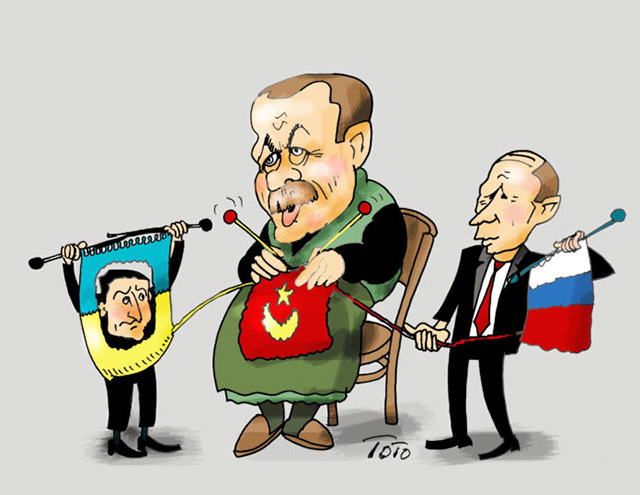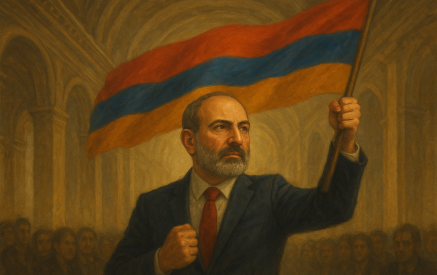Edmond Y. Azadian
The Chinese adage that crisis creates opportunity has given a new lease on life to Turkish President Recep Tayyip Erdogan’s policies and Turkey itself.
The dramatic decline of the Turkish economy and dimming of hopes for Erdogan’s reelection in 2023 had startled Turkey’s ruling AK Party into looking for a realignment of its foreign policy to avoid an impending catastrophe down the road.
Read also
Turkey’s expansionist policies had antagonized countries near and far; it led to tensions with Greece over the Aegean, Cyprus over explorations of the island’s offshore gas reserves, Israel over support for Hamas and the Palestinian cause, Saudi Arabia over the murder of Washington Post journalist Jamal Khashoggi in the Saudi consulate in Istanbul, the United Arab Emirates over the Abraham Accords recognizing Israel, Egypt over its support for the Muslim Brotherhood, China for stoking violence in the Turkic Xinjiang Province, Armenia over the Karabakh War and the US and NATO countries for purchasing S-400 military planes from Russia.
All these missteps had led the country to isolation and economic crisis.
While Turkey was looking for opportunities to mend fences with neighbors and allies, that opportunity arrived with the eruption of war in Ukraine. The trips by French President Emmanuel Macron and German Chancellor Olaf Scholz could not dissuade President Vladimir Putin from pulling the trigger. And after the beginning of the war, the visit of Israel’s Prime Minister Naftali Bennett or calls from President Macron were to no avail. Even after his call, Macron warned the media “to expect the worst.”
War is brutal and the media is powerful, therefore it was easy for the West to orchestrate a worldwide protest against Russian aggression in Ukraine, especially in light of seeing the toll of war in real time. But, after all, it was not a bad deal for the West to weaken Russia through economic hemorrhage at Ukraine’s expense, although sanctions against Russia will have a ricochet effect worldwide; oil and metal prices are at record highs already. Five thousand sanctions have been instituted by Western countries. Bloomberg has labeled these measures as the “nuclear level of sanctions.”
After the failure of the third meeting between Ukrainian and Russian delegations on the Ukrainian and Belorussian border, a diplomatic breakthrough has been announced. Russia’s Foreign Minister Sergei Lavrov and his Ukrainian counterpart, Dmytro Kuleba, will be meeting at the Diplomacy Forum of Antalya, in Turkey, scheduled to take place March 11 though 13, Turkish Foreign Minister Mevlut Çavusoglu tweeted.
NATO Secretary General Jens Stoltenberg and European Union’s Foreign Policy Chief Josep Borrell are also on the list of participants.
Erdogan’s and Macron’s earlier appeals to President Putin were rebuffed. He conditioned those negations with an a priori acceptance by the Ukrainian government to adopt a policy of neutrality, along with recognizing the independence of Luhansk and Donetsk and admitting that Crimea is a part of Russia. For a while, Russia’s other high-stake demand was for NATO to return to its 1997 border has been sidelined.
The world will find out soon what has been the compelling factor which brings Russia to the negotiating table. Incidentally, we have to note that Armenia’s Foreign Minister Ararat Mirzoyan and chief negotiator for talks between Armenia and Turkey Ruben Rubinyan are also invited to the forum.
The European Union’s Ambassador to Ankara Nikolaus Meyer-Landrut has lavished praise on Turkey for its actions in the Ukrainian crisis. “We appreciate Turkish involvement, engagement and anticipation with NATO. We appreciate very much that it voted with the majority of states at the UN.”
Turkey’s relations with Ukraine and Russia have also been highlighted and certainly the US and the European Union have been encouraging Turkey to play the role of mediator.
What Turkey has achieved thus far is no less than a diplomatic coup which will bring it back into the fold of the international community and reward it commensurately.
As if that diplomatic coup were not enough to propel Turkey centerstage, all its foes are lined up to visit Turkey soon to iron out their drawn-out problems with Ankara. Thus, after more than 10 years of tensions between Israel and Turkey, Israel’s President Isaac Herzog will be visiting Ankara to restart friendly relations between the two countries. Turkey might easily sell out the Palestinian cause and expel Hamas representatives from Turkey. These have been Israel’s demands to President Erdogan, who was only paying lip service to the Palestinian issue to enhance his image in the Muslim world.
Next is the visit of Greek Prime Minister Kyriakos Mitsotakis who will meet President Erdogan on March 13. Greece and Turkey have been accusing each other over provocations in the Aegean Sea. Recently, Foreign Minister Çavusoglu stated that the sovereignty of the Aegean islands could be challenged if Greece continued to violate the Treaty of Lausanne of 1923 and the 1947 Paris Convention.
The pieces of Turkey’s foreign policy will be falling into place when the next delegation from Armenia turns up at Turkey’s doorsteps to negotiate the lifting of the blockade and restoration of diplomatic relations.
Within the context and background of Turkey’s diplomatic recovery, we need to view and analyze the quandry of Armenia’s nascent diplomacy. Armenia, particularly with the war in Ukraine, has landed in a hard place. First, the fate of the 400,00-500,000-strong Ukrainian-Armenian community is a serious cause for concern. Were it not for the West’s overwhelming support of Ukraine, Armenia would have been justified to write off Ukrainian President Volodymyr Zelenskyy’s government’s fate in light of its military support for Azerbaijan and the latter’s jubilant congratulations sent to Azerbaijan’s President Ilham Aliyev after the 44-Day War. But the issue is more complex than that. Armenia has to balance its act delicately between its strategic ally Russia and developing ties with Europe and the US.
Armenia was almost alone in voting against suspending Russian representation in the Council of Europe. It abstained from voting at the UN Human Rights Council to suspend Russia. It also cast a similar vote at the UN General Assembly. We are not sure yet if that cautious stand jeopardized the EU’s promised 2.6 billion euro aid but it looks like that policy has angered Russia which expects unwavering allegiances.
Indeed, Russia’s Foreign Minister Lavrov has placed a phone call to his Armenian counterpart, Ararat Mirzoyan, “to coordinate policies on the Ukrainian war.”
No other member of the Collective Security Treaty Organization (CSTO) has received such a mysterious and unsettling call, although they have not even cast any votes in world bodies. It looks like Lavrov has reprimanded Yerevan for its attempted neutral position. Pretty soon, Prime Minister Nikol Pashinyan is scheduled to visit Moscow to sign an agreement, like that one that Putin negotiated with Aliyev in the hours before the launch of Russia’s attack on Ukraine. Certainly Pashinyan will get an earful in Moscow.
The Putin-Aliyev agreement raised Azerbaijan to the level of strategic ally of Russia. That treaty was also meant to neutralize the “Shusha Proclamation” that had been recently ratified in the parliaments of Turkey and Azerbaijan, cementing the union of those two states. At this point, it seems that Mr. Putin could not care less if his agreement with Azerbaijan contradicts the military and political treaty which Russia has signed with Armenia. This cavalier treatment of Armenia reflects a recent statement by Belarussian President Alexander Lukashenko, who said, “Who cares about Armenia? Sooner or later, it will come begging to become a ‘union state’ state” with Russia.
On the other hand, the French government has savoir faire; through all the niceties of diplomacy they have delivered the same message to Armenia. French President Macron placed a phone call to President Aliyev. Earlier, France as the current president of the EU, had rewarded Azerbaijan with 2 billion euros in an aid package for Aliyev’s pledge to supply the European Union with natural gas in case the Russian deals fall through.
After his call to Aliyev, Mr. Macron invited Prime Minister Pashinyan to Paris to celebrate the 30th anniversary of the diplomatic relations between the two countries. The festivities on March 9 featured artists and scientists, but no diplomatic component.
To top it all, the Organization for Security and Cooperation in Europe (OSCE) and its Minsk Group’s mission to Artsakh has collapsed. The group already had its hands full with the Ukrainian crisis and now it has lost credibility and cooperation between its cochairs, representing Russia, the US and France. The OSCE Minsk Group has been Armenia’s last hope as it still maintained on its agenda the settlement of Karabakh status. With Western sanctions taking effect, there is a flood of Russian nationals arriving in Armenia. Yerevan will find out soon if that is a boon or bane.
As diplomacy works its way through the crisis of Ukraine, Armenia is caught between a rock and a hard place.

























































